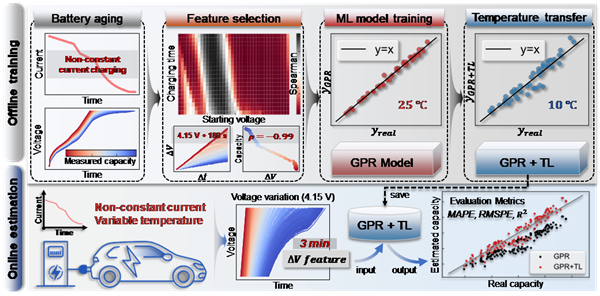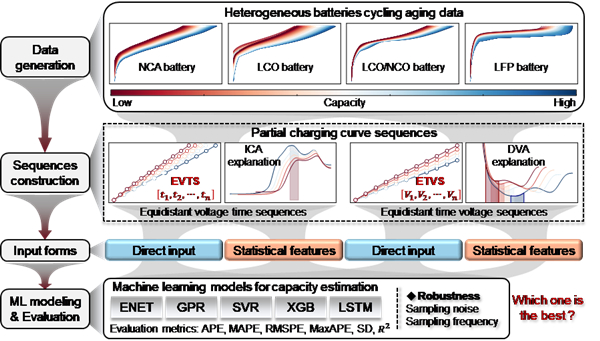XJTU researchers publish papers on battery capacity in leading journals

A graphic in the paper titled "A fast data-driven battery capacity estimation method under non-constant current charging and variable temperature".
Non-constant current charging and variable-temperature operating scenarios are inevitable in real-life applications. However, the current methods of estimating constant current charging cannot be applied in such scenarios.
To address this problem, professors Mei Xuesong and Xu Jun as well as their team from the School of Mechanical Engineering at Xi'an Jiaotong University (XJTU) have proposed a data-driven method adapted to non-constant current charging combined with Gaussian process regression.
This method can achieve rapid capacity estimation for lithium-ion batteries undergoing temperature variations and non-constant current charging within just three minutes. The average estimation error is only 0.65 percent, representing an accuracy improvement of more than 60 percent compared to preexisting classical methods.
It also presents a new solution for non-constant current charging and capacity estimation across a wide temperature range for lithium batteries.
With its general applicability and practicality, the combination of partial charging curves and machine learning (ML) for battery capacity estimation has attracted widespread attention.

A graphic in the paper titled "A comparative study of data-driven battery capacity estimation based on partial charging curves".
However, a clear classification, fair comparison, and performance rationalization of these methods are all lacking, due to the scattered nature of existing studies. To this end, the research team also developed 20 capacity estimation methods from three perspectives: charging sequence construction, input forms, and ML models.
The researchers generated 22,582 charging curves from 44 batteries using different chemicals and operating conditions for cross-validation. The work provides valuable insights and guidance for data-driven methods based on partial charging curves to estimate battery capacity.
Their research findings were published in Energy Storage Materials and Journal of Energy Chemistry under the titles "A fast data-driven battery capacity estimation method under non-constant current charging and variable temperature" and "A comparative study of data-driven battery capacity estimation based on partial charging curves".
XJTU served as the sole corresponding institution of the papers, with doctoral student Lin Chuanping as the first author and professor Xu Jun as the corresponding author.

